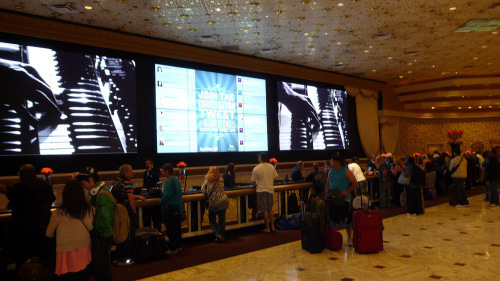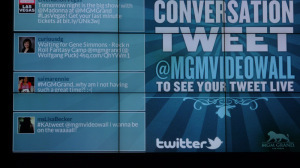Social media and what it can do for your reputation

The lobby area at the MGM Grand with a big TV screen showing scrolling Tweets about the hotel
MY WIFE was less than impressed when we stayed in Las Vegas during a recent holiday in the United States so she took to Twitter to register her feelings.
We were staying at the vast MGM Grand, one of the biggest hotels on The Strip, but with no interest in gambling we were feeling a little isolated in this extraordinary city surrounded by hundreds of miles of the Mojave Desert.
As we lazed in our room on the 14th floor, she Tweeted: “#MGMGrand..why am I not having such a great time?!”
We assumed there would be a reply by whoever is running this multi-million dollar establishment’s Twitter account, perhaps to suggest some activities, a local landmark worth a visit or a good restaurant to eat at.
Silence. No response at all from the mighty MGM Grand. So imagine our surprise a few hours later when we walked through the lobby area and spotted my wife’s Tweet on a massive screen located on the wall behind reception staff who were checking in new residents.
The comment was certainly not a ringing endorsement of the hotel and yet the owners saw fit to broadcast the remark on a scrolling screen of Tweets in full view of everyone.

My wife’s Tweet announcing she is bored at the MGM Grand is broadcast to everyone arriving at the hotel
The MGM Grand has nearly 86,000 followers on Twitter and you would have thought it was a key marketing strategy for them to engage with customers, those who are happy and those who are not.
Now contrast this incident with an experience we had after booking afternoon tea at The Ritz in London. Just 20 minutes after Tweeting that I had booked a table there, the famous old hotel and tea room Tweeted back to say they hoped we had a good time. The Ritz also sent a Tweet to us on the day welcoming us to the establishment.
Another example of great customer relations on Twitter came while we were eating the famous sticky toffee pudding at a shop where the dish originated at in Cartmel in the Lake District earlier this year.
“At Cartmel. The home of sticky toffee pudding @CartmelSticky – trying hard not to resist having any…..oh damn!” I Tweeted.
Within seconds came the reply: “@CartmelSticky: @renster157 – don’t resist, dive in and enjoy!!”
At this point I should declare an interest. As a PR consultant I advise clients on how to use social media to raise their profile and build relationships with customers.
I continue to be amazed at the number of businesses and organisations who fail to grasp the power of social media – the potential it has both to promote an organisation as well as damage a hard-won reputation.
Some of my prospective clients have dismissed the likes of Facebook, Twitter and You Tube as ‘kids’ stuff’ and not appropriate for their business. Others simply don’t understand it and choose to ignore social networking conversations which can have a huge impact on their company’s fortunes.
A critical comment on Twitter about a sub-standard hotel room can have the effect of persuading people who follow that individual not to stay there in the future.
Likewise, friends of someone who gives a poor review of a restaurant meal will prevent them booking a table there anytime soon.
Research shows that people trust and respect the opinions of their peers. They are more likely to buy a new mobile phone, holiday in Italy or read a particular novel because of a friend’s recommendation.
And it is not just friends we seek out for advice when we are unsure whether to invest in something. Most of us now go online to read reviews of a product before we decide to take the plunge on a new digital camera or fridge freezer.
Simply advertising something in a newspaper or on television is no longer enough. Businesses rely on the advocacy of satisfied customers Tweeting about a product or service or posting a favourable review on Facebook. We all now have the capacity to be unpaid brand ambassadors for the likes of Apple, Dyson and EasyJet.
This effect is perhaps even more profound on a local level when you are championing or criticising a Chinese takeaway or a hair salon in your town or city. These businesses rely on regular return custom and every time someone praises them on an online social network it can be just as powerful as a front page story in the local newspaper.
So my advice would be to engage with your customers, whether you are a huge hotel on the Las Vegas Strip or a tea room in Middle England. The likelihood is those people will return. And they will tell their friends to as well.





